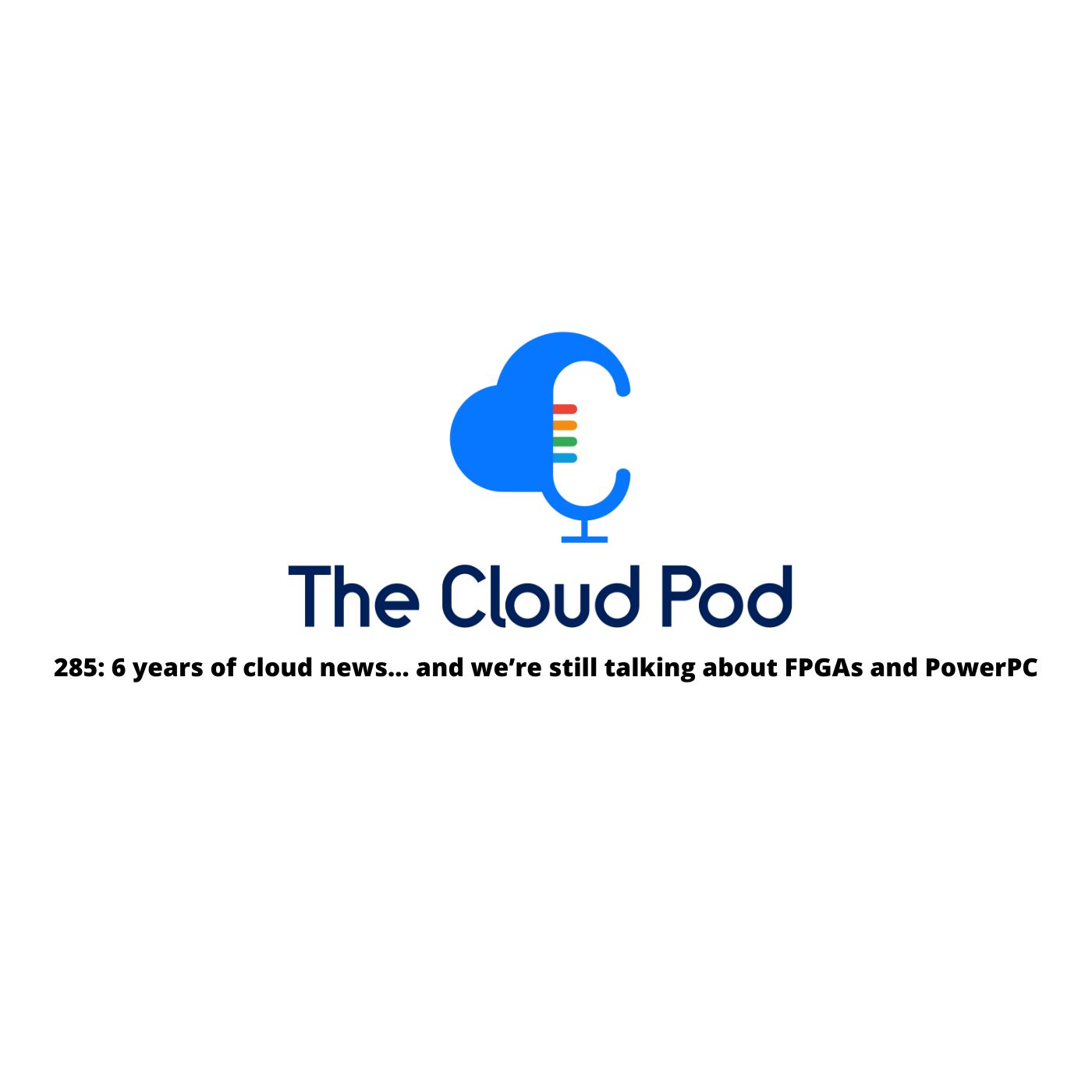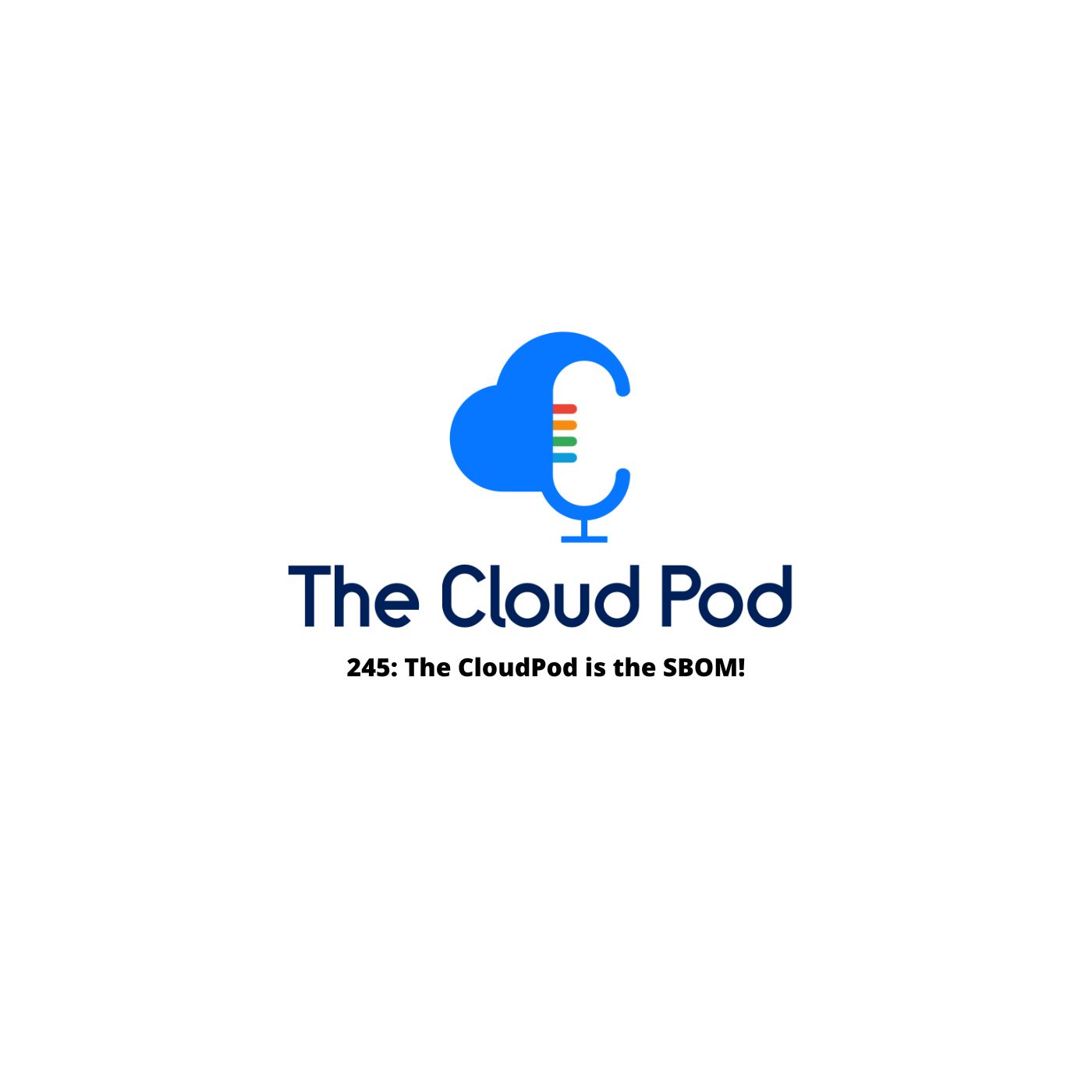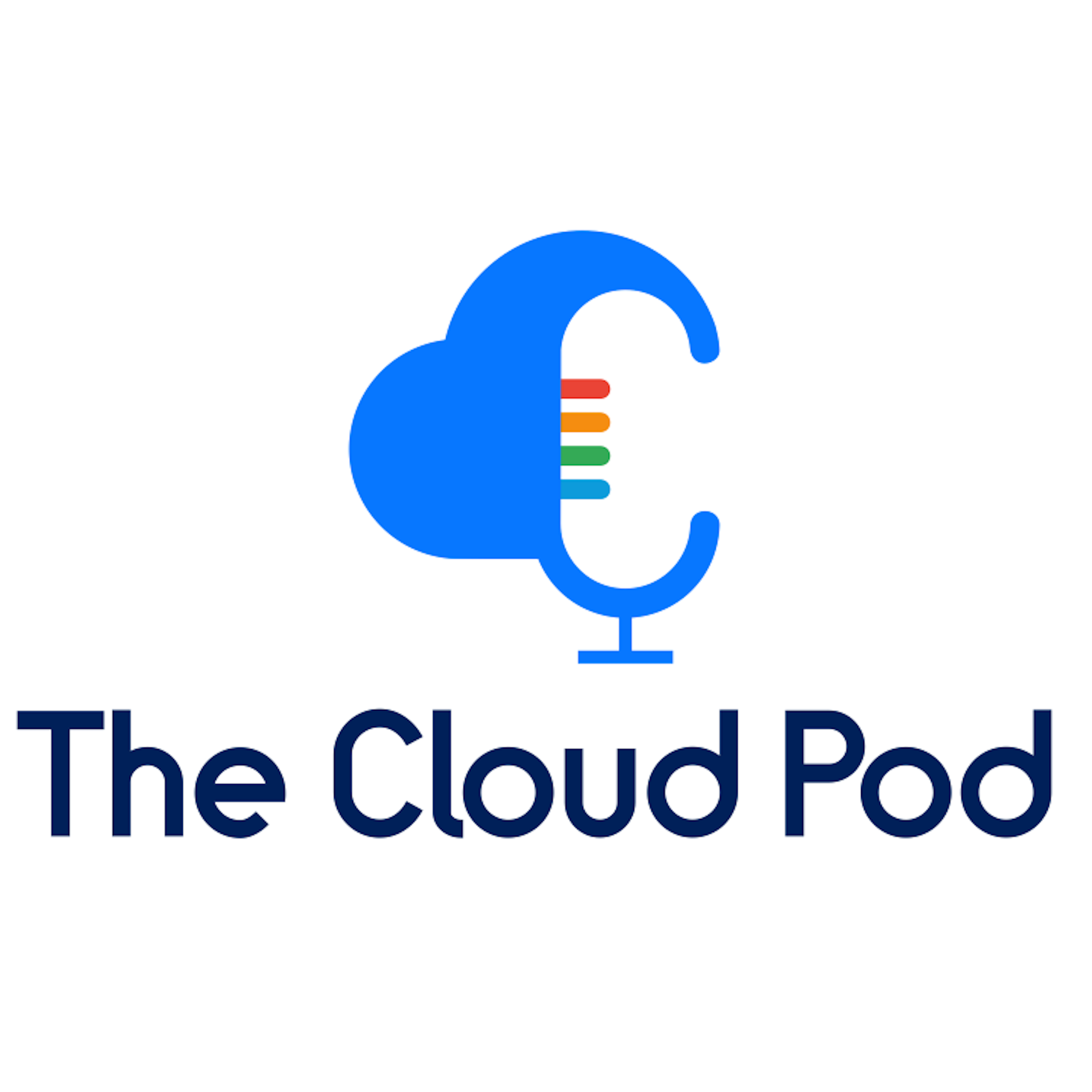The Cloud Pod Sees the Irony of Using AI to Assist with Climate Change
Welcome to episode 239 of The Cloud Pod podcast, where the forecast is always cloudy! Jonathan, Matthew and Ryan are your hosts this week as we talk about all things AI and Climate Change - and Google’s assertion that their AI is going to fix it all. Also on today’s agenda: updates to Google Next’s new dates, Azure’s chips, Defender, and all the shenanigans over at OpenAI. Join us!
Titles we almost went with this week:
Microsoft Ignites my dislike for their conferences
Google keeps using that Sustainability word….
The gift of no cost learning
The CloudPod has an advent calendar for AI
A big thanks to this week’s sponsor:
Foghorn Consulting provides top-notch cloud and DevOps engineers to the world’s most innovative companies. Initiatives stalled because you have trouble hiring? Foghorn can be burning down your DevOps and Cloud backlogs as soon as next week.
General News
00:50
Broadcom announces successful acquisition of VMware
- Broadcom has completed its acquisition of VMware… and apparently it’s a new and exciting era! (Hopefully more exciting than Tanzu has been.)
- Broadcom is mostly known for networking communication chips, but has been diversifying their portfolio for a while now.
- Vmware joins companies such as:
- Rally Software
- CA Products
- Plex (not *that* plex)
- Appneta
- Clarity
- Symantec
- Siteminder
01:58 Matthew - “I feel like whenever you get acquired, a lot of the duplicated admin services and like HR, finance, some of those kind of naturally - like whenever a company gets acquired, I feel like there's always layoffs within the first six months, and it's really just a lot of those overlapping services now that the parent org has. But I know that they own Symantec. That was news to me.”
04:36 Ryan - “I think that the big value prop was for a lot of these things was, you know, being able to run that virtualized infrastructure and then the partnerships are, you know, to be able to run that with the same skill sets and the same people running both without having to get into the specifics of, you know, AWS or Azure cloud specifics. And so offering that as sort of a generalized compute… I think as cloud has become more prevalent and popular and there's more people that know it, not enough, but still more. I think that value really goes down where you no longer need that sort of UI driven cloud management service that VMware provided for years.”
AI is Going Great!
06:11 **See Aftershow**
AWS
06:17 If you haven’t already, go listen to ep 238!
That’s our AWS re:Invent recap show; there really isn't any AWS news outside of that for this week.
GCP
06:28
Early Registration Now Open for Google Cloud Next ’24 (April 9-11) in Las Vegas
- You may think Google Next just happened… and you would be right. But as part of the move to Las Vegas, they have moved it up to April. Surprise!
- Early bird pricing is available for 999 or 50% off the full price of 1999.
- Plus you can get access to the room blocks at the Mandalay Bay and be close to the sharks. (The fish sharks, not the card sharks. Stay away from those.)
- Early Bird registration includes a year subscription to Innovators Plus, if you’re into that sort of thing.
10:28 Jonathan - “I think the value has never really been in the announcements, which you can get from anywhere. Sometimes the sessions are good, but they're mostly available online. And they don't teach you anything that you can't learn from blogs or people in the industry or anything else. I think the absolute value of things like Next or Reinvent is a community that goes there and gathers and it's all the extra stuff to the actual event that makes it worth attending. So it's almost worth going to Vegas, not buying the ticket, and just socializing and meeting people.
13:22
Cloud Storage Autoclass now available for existing Cloud Storage buckets
- Last year Google announced autoclass functionality for new buckets, and now you can apply it to existing buckets as well.
- Two types of autoclass default which moves between standard and nearline and Opt-In which moves between standard, nearline, coldline and archive classes
13:55 Ryan - “...anything where the service is enabling you to save a little money by moving your least accessed data to a cheaper storage tier with different performance characteristics, I really like. And I like how automatic and sort of ubiquitous these features are becoming.”
17:23
Looker Studio brings powerful explorations, fresher data and faster filtering
- Several Enhancements to Looker studio including:
- Personal Report Links
- Automated Report Updates (auto-refresh)
- Faster Filtering in reports
- Pause Updates
- View Underlying Data
19:55
Introducing BigQuery cross-region replication: enhanced geo-redundancy for your data
- Google is announcing in preview Cross-region dataset replication, which allows you to easily replicate any dataset, including ongoing changes, across cloud regions.
- In addition to ongoing replication use cases, you can use cross-region replication to migrate BigQuery datasets from one source region to another destination region.
22:12 Jonathan - “The nice thing about it is the way it sort of works under the covers in that you don't have to address the replica using a different name. If you're in that region and you want to make a read, it will read from the replica. So if the primary region goes down, you don't need to update anything. The queries will still work. It's just magic in the background. And if you want to promote the secondary region to become a primary and be the writeable region, you can do so. And it's all just very seamless. It's very nicely done.”
24:17
Accelerating climate action with AI
- I mean… this one feels like a stretch.
- Google, in conjunction with Boston Consulting Group has released a report which shows that AI has the potential to mitigate 5-10% of the global greenhouse gas emissions by 2030
- They said this will happen by burning billions of Watts of power with GPU’s.
- Sure, Jan. (insert Marcia Brady gif here.)
- The report lists three ways that AI can have a transformative effect on climate progress:
- Providing helpful information, such as fuel efficient routing.
- Predicting climate related events, particularly around floods.
- Optimizing Climate Action.
- They gave an example about analyzing contrail data including satellite imagery, weather and flight path data. AI could use that data to develop contrail forecast maps and make suggestions for pilots that avoid routes that create contrails. In test flights they found pilots reduced contrails by 54%.
- Now, if they could only figure out how to cut emissions from all the private jets that landed at COP28 we might actually get somewhere.
- Just to point out - Europe is still building power stations to power data centers because of the demand from cloud providers…so this sounds like a bit of a stretch to us. It’s great marketing though!
30:10
How Google's data centers help Europe meet its sustainability goals
- And in an article that’s completely different from the one above (we promise!) Google's data centers are going to help the EU meet its sustainability goals, which again… seems strange.
- Digitalization is going to reduce greenhouse gasses. They left the definition of digitalization to the reader to figure out, but it must be good... right?
- Google operates the most energy efficient data centers, off setting energy consumption with renewable sources like Solar and Wind. (As does AWS fyi)
- They start local projects to support our communities - like supplying hot water for heating. So, gold star.
- We feel like you're really stretching here Google, yet again.
13:17
12 days of no-cost training to learn generative AI this December
- If you are clueless about Generative AI, Google has you covered with free AI training. It’s the advent calendar you didn't know you needed.
- The “gift” of no cost learning
Azure
34:27
Microsoft Azure delivers purpose-built cloud infrastructure in the era of AI
- At Ignite, Azure announced their first Custom CPU Chips. Neat!
- Their first custom AI accelerator is called Azure Maia, designed to run cloud based training and inference for AI workloads such as Open AI, bing, Github, Copilot and ChatGPT.
- Maia 100 is the first generation in the series, with 105 billion transistors, making it one of the largest chips on the 5nm process technologies. (105 billion is a lot, if you’re wondering.)
- In addition to Maia, they are announcing Azure Cobalt, built on Arm Architecture for optimal performance or watt efficiency, powering common cloud workloads for MS cloud.
- Cobalt 100, the first generation, is a 64bit 129 core chip that delivers up to 40% performance improvement over current generations of Azure Arm chips and is powering services such as Teams and Azure SQL.
41:04
Microsoft Announces General Availability of Defender for APIs
- GA of Microsoft Defender for API’s, designed to protect organizations against API security threats.
- Defender for APis offers lifecycle protection, detection and response coverage for organizations managed APIs.
- Features:
- Microsoft Defender Cloud Security Posture Management (CSPM) Integration
- API Attack Path Analysis
- Enrich API data security MS information Protection (MIP) Purview integration
- Enable full lifecycle API protection from code to cloud
- Why Defender for API you ask? These common use cases may help you figure that out:
- Gain a unified inventory and aggregated view of all your Azure API management in a single dashboard.
- Classify APIs that handle sensitive data and support risk prioritization.
- Harden API configurations and easily assess API gateway for security best practice controls.
- Address Security recommendations to identify unused and unauthenticated APIs.
- Assess API security findings in Cloud Security Explorer and API attack path analysis.
- Gain a comprehensive coverage of the OWASP API Top 10 threats, including data exfiltration and volumetric attacks.
- Leverage workflow automations to action on your API security recommendations and findings.
- Stay up to date with API Security workbook that provides summary of posture findings and security alerts.
- Seamlessly integrate with Microsoft Sentinel and other popular SIEM solutions for efficient threat remediation.
- Interested in pricing info? Get that right over here.
41:54 Ryan - “Sort of buried in that last one is probably the best part of this announcement, which is the big difference about this and something like a WAF is that this is allowing you to test your controls and set up in your development pipeline, right? Which is not something that's been available today, anywhere else. And so like typically, you have your WAF managed by either a centralized cloud or security team and you have your development staff, and when it's all working great and cohesive together, everything's hunky dory, but then you add a new method, a new path that's not defined properly in the WAF or it conflicts with some sort of rule. And then all of a sudden you get a very, very difficult problem to troubleshoot, and it's going to take coordination across multiple teams in order to do that. And so it's sort of a pain, right? And so I also like the fact that putting in the development pipeline, it closes the feedback cycle.”
44:09
Azure Backup for AKS: Cloud native, Enterprise ready, Kubernetes aware backup
- Microsoft shows that they really don’t understand containers by announcing the GA of Azure Backup for AKS, a simple, cloud native solution that enables you to protect your AKS clusters via backing up K8 workloads deployed along with the application data
- Customers running stateful AKS clusters previously relied on native Azure Disk backup service to protect their applications stored in persistent volumes. While this service offered a convenient way to backup data, restoring these snapshots to the cluster required substantial effort from the customers.
- Apparently this new tool will automate that; but maybe don’t do it. Thankfully Justin isn’t here to put in his two cents.
48:15
Public preview: Private subnet
- Announcing the public preview for the ability to create private subnets.
- Currently, when virtual machines are created in a virtual network without any explicit outbound connectivity, they are assigned a default outbound public IP address.
- These implicit IPs are subject to change, not associated with a subscription, difficult to troubleshoot, and do not follow Azure's model of "secure by default" which ensures customers have strong security without additional steps needed. (The depreciation for this type of implicit connectivity was recently announced and is scheduled for September 2025.)
- The private subnet feature will let you prevent this insecure implicit connectivity for any newly created subnets by setting the "default outbound access" parameter to false. You can then pick your preferred method for explicit outbound connectivity to the internet.
- Today, we learned Azure did not do this by default. Maybe they were running out of public IP space? We’re mostly hoping this doesn’t cause a bunch of people to redeploy just to take advantage of it.
50:29 Matthew - “It was just fascinating that it is 2023, almost 2024. And this was not an option out there prior to this. And it's actually not even GA’d yet. And this was a release during Microsoft Ignite. And I was just like, wait, what? This, this is not the way this works. Like my brain just didn't process that, the subnets that had nine gateway still, you know, the instances still had, sorry, the virtual machine still had, you know, public IP addresses somewhere.”
After Show
53:50 I think the Open AI board had more transparency issues than Sam Altman
OpenAI announces leadership transition
A statement from Microsoft Chairman and CEO Satya Nadella
Sam Altman returns as CEO, OpenAI has a new initial board
OpenAI Will Add Microsoft as Board Observer, Plans Governance Changes
- WTF just happened at Open AI?
- On Friday after recording our last episode and the Reinvent prediction show news came out that the Open AI board had fired Sam Altman and appointed CTO Mira Murati as Interim CEO.
- Greg Brockman also was stepping down from the board, but was going to stay in his role.
- The Board cited transparency issues for the reason for the departure.
- Greg later resigned as well as 100’s of employees threatened to leave starting a crazy weekend. Rumors ran throughout the weekend on what had caused Sam to get fired, the ultimatum from employees that they would resign unless Sam was reinstated.
- By Monday morning talks had fallen apart and Satya Nadella announced that Greg and Sam would join Microsoft leading a new AI R&D team. Open AI also announced Emmett Shear would be the new CEO of Open AI. Shear was the former CEO of Twitch who resigned in March 2023.
- Wednesday before Thanksgiving it announced that Sam Altman would be returning to Open AI.
- On November 29th it was official as Open AI made a statement that Sam Atlman was back as CEO, Mira Murati will return as CTO, and Greg Brockman returns as president. Several board members were ousted as part of the changes, and Microsoft is taking on an advisor role on the board
- Ilya Sutskever was one of the key board members and a co-founder of Open AI. Will no longer be on the board, but they hope to have a role for him inside the company.
Closing
And that is the week in the cloud! We would like to thank our sponsors Foghorn Consulting. Check out our website, the home of the Cloud Pod where you can join our newsletter, slack team, send feedback or ask questions at theCloud Pod.net or tweet at us with hashtag #theCloud Pod


